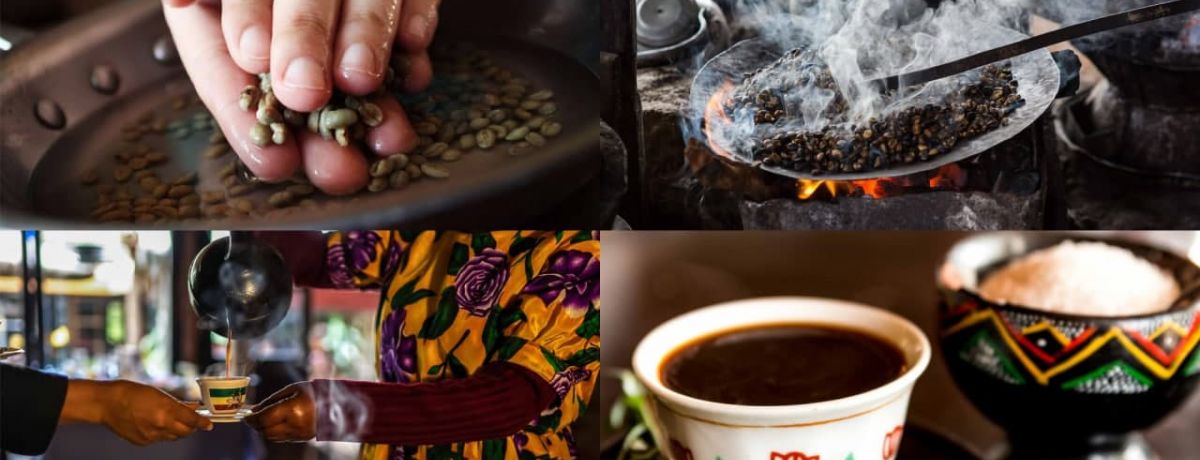
Ethiopian Coffee Ceremony
Coffee to Ethiopians is a life routine deeply rooted in the culture, Most Ethiopians drink at least 3 cups of coffee per day while spending time with Friends, Family, and Collogues.
In Ethiopia, the most common time of day when coffee is enjoyed is at lunchtime, where people gather to drink "Jebena Bunna" while chatting and socializing, at home, in cafes, or in the office having the Ethiopian “Buna” Ceremony, which is endemic only to Ethiopia.
The ceremony is a ritualized form of making and drinking coffee, sensually rich and long, the Ethiopian coffee ceremony is not for those in a hurry – or with less than superhuman tolerance for caffeine. But, like a drink, it's an experience to be enjoyed.
Coffee ceremony's start with the host, always female, spreading an assortment of fresh grasses and flowers on the floor. An incense burner, typically filled with frankincense or sandalwood, is lit, filling the air with an intoxicating aroma.
This ceremony has three parts before actually getting to drink the coffee. First is washing the coffee beans, second roasting it on an open flame on a pan which is made of steel, and the beans are roasted till they are darkened. At the end of the roasting process, often the host will encourage guests to smell the strong aroma of the beans, holding the pan in front of their eager noses. By now, the smell of coffee is mixing with the incense, creating an intoxicating effect, after which the beans are grounded using a pestle and mortar.
The third and final process is brewing the coffee in a “Jebena” a special spouted pot made out of hand-crafted clay containing boiling water. The Jebena is placed back over the charcoal in order to brew. Once it is brewed the host pours the coffee into a small cup called “sini”, for all participants by moving the tilted boiling pot over a tray. The grounds are brewed three times: the first serving is called ABOL, the second TONA, and the third BARAKA (meaning 'to be blessed'). People add sugar to their coffee, or sometimes salt or traditional salted butter is used instead. The ceremony is accompanied by a small traditional snack called “Buna Kurse” which literally translates to Coffee Breakfast these snacks could range from popcorn “Fendisha” to roasted barley knows in Amharic as” kollo” or traditional Sourdough bread called “AMBASHA”. Typically, you will also find a local herb rue called “Tenaadam” added into the coffee as a flavoring ingredient, which gives the coffee a refreshing citrus note.
In Ethiopia coffee is salient, apart from its cultural and social symbolism it is Ethiopia's most famous Export, about 3% of all coffee traded worldwide has Ethiopian origin. And if you are looking to Experience the Buna Ceremony for yourself, well then may we suggest you make your next trip to the land dubbed the Cradle of Humanity.
References
1. Tyson J.2020. The Coffee Ritual: Ethiopia's Jebena Buna Ceremony. https://theculturetrip.com/africa/ethiopia/articles/the-coffee-ritual-ethiopias-jebena-buna-ceremony/> [Accessed 25 February 2021]
2. En.Wikipedia.org. Coffee ceremony. Available at: https://en.Wikipedia.org/wiki/Coffee_ceremony> [Accessed 25 February 2021].
